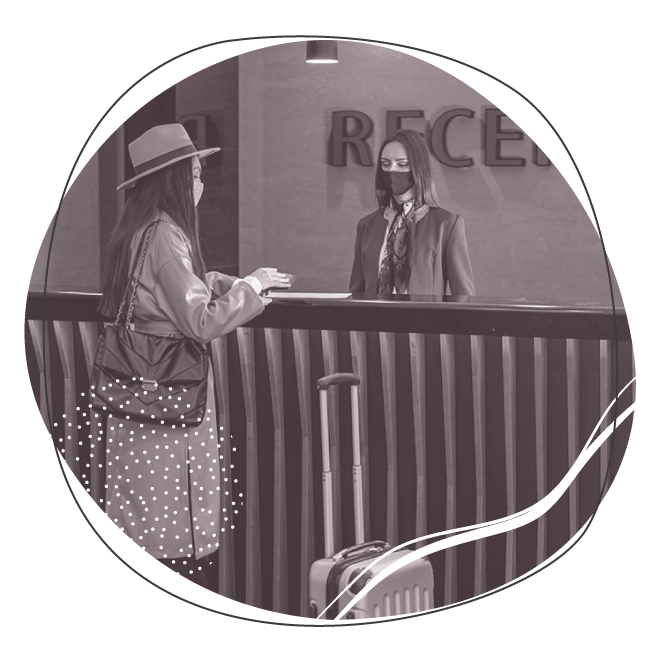

In the previous lesson you learned about the topic of hospitality and were able to review two of its most representative sectors, one of which is lodging, also called accommodation.
In this technical and tourism English lesson you will learn about this topic in depth, as it is one of the most prominent tourism sectors today, both locally and internationally. This means that in this particular environment, interactions between guests of different nationalities could occur, so it is usually necessary to use English as a common language to communicate between guests and staff of the place.
To learn how to express yourself appropriately in this type of context, pay attention to the following information. Starting with a description of the term accommodation:

As you know, there are different types of accommodations options available. Below you will learn more about them so that you know exactly what you mean the next time you need this type of information.
After learning about these types of accommodation in detail, take a look at the following examples to have another reference of what they are like:
Now that you are able to identify the accommodation alternatives, reflect about the type of accommodation you have stayed in before, what was your favorite?
Despite the fact that there are many accommodation options available today, there is no doubt that hotels are still the best known. Regardless of where they are, thousands of people around the world continue to use the services offered by hotels as their preferred type of accommodation, which is why the hotel business has become one of the largest and most diverse industries worldwide.
Hotels have several services available to guests, including their own restaurants, amenities such as gyms and swimming pools, and a variety of rooms so that each person can choose the one that best suits their needs. Below you will learn some information about the types of rooms you can find in a hotel. Use it the next time you need to make a reservation in English.
Look at the images below to know the type of rooms you can find in a hotel:
Knowing the types of rooms available in a hotel is key when making a reservation. To make sure that you have correctly understood the differences between each of them, read the following information:
In addition to being able to identify what these rooms consist of, something else that is especially useful when checking into a hotel is knowing how to refer to its staff. This is not only a sign of respect towards the service staff in general, but it is also a way to communicate more effectively and fluently when having a conversation in this environment. Keep reading to learn more about this!
Some of the most common hotel staff members include:
Manager: A hotel manager oversees the daily operations of a hotel. A manger also handles some financial and accounting duties and makes sure to hire, supervise and direct the hotel staff to ensure everything runs smoothly.
Housekeeper: Hotel housekeeping duties involve managing the general upkeep of the hotel. This includes several different tasks such as dusting, cleaning hotel rooms and common areas, replenishing supplies, and others.
Receptionist: The receptionist or front desk agent serves as the first point of contact for all guests. This person is in charge of greeting guests as they enter the hotel, managing the check-in and check-out process, answering questions and requests, answering and forwarding phone calls, managing reservations and guest bookings, and assisting with administrative tasks at the front desk.
Room attendant: Room attendant duties usually involve seeing to the needs of the guests. This includes taking room service orders, delivering items to guest rooms, assisting guests in the event of a general problem with the furniture or services in their room, informing the staff in charge of handlining repairs, and others.
Porter: Hotel porters responsibilities include carrying and labeling guests’ luggage, ensuring the building entrance is always clean, directing guests to the reception area or the appropriate office or room, arranging taxi services upon request, among others.
Now that you know the staff of a hotel, pay attention to the following audio to get an idea of how you can approach them in case you need to do so later.
Instructions: Listen carefully to the audio and complete the activity afterwards.
Requesting Help from Hotel Staff
 Phone call to the hotel reception
Phone call to the hotel reception
In the following table you can also find some sentences that may come in handy when asking the hotel staff for help, or to thank them for their service.
If you need more information to understand all you have reviewed so far, you can also watch the following video:
Accommodation (Technical and Tourism English)
Click on the button below to download a summary of what you just watched.
Additionally, the next video contains information about the type of vocabulary you can use in a hotel or other type of accommodation setting. You will find it really useful. Take a look!
Useful English Vocabulary for Hotel Stays and Accommodation
You can download a PDF file to get extra information about this too.
What do you think about this topic? Do you think you would be able to identify and communicate with the hotel staff easily now?
The following activities will help you find out how much you have learned.
Instructions: Watch the following video and write the correct answers to complete the activity afterwards. Take notes on the questions and the types of rooms that are mentioned.
Continue with a reading exercise.
Instructions: Read the following descriptions about the types of accommodation and choose the correct answer for each case.
Don’t give up. You can do it! Complete the speaking exercise below.
Instructions: Practice your oral expression in English by repeating some sentences. Pay attention to your pronunciation.
In this Technical and Tourism English lesson you learned about the topic of accommodation, which not only helped you reinforce some of the content from the previous lesson, but also allowed you to discover new information about various types of accommodations, hotel facilities and staff.
Moreover, now you know new vocabulary and phrases that you can use with confidence the next time you need them, whether when talking to a friend or relative, as a guest at a hotel, or as a staff member. Keep practicing until you master all this content.
Congratulations! All you need to do now is answer a short quiz.
Instructions: Complete the following quiz to test your general knowledge about the topic of accommodation. Good luck!